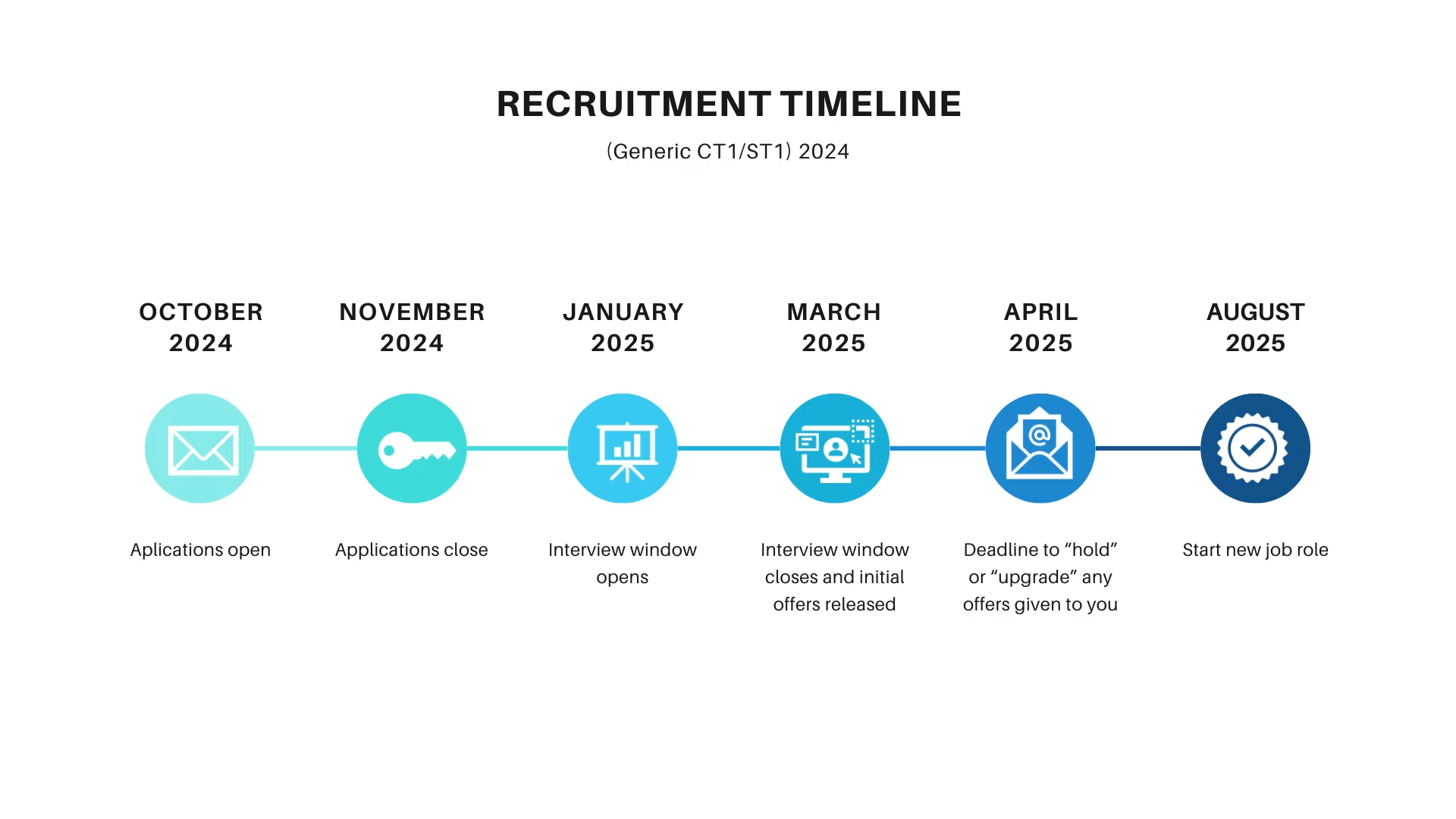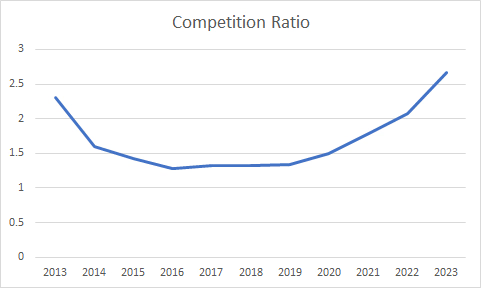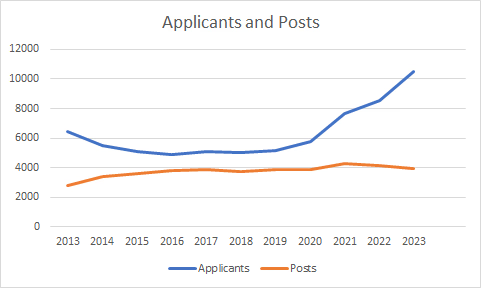Before we talk about speciality training and applications we should brush upon the UK Foundation Programme. What is this and how does it work? If you want to read more then head over to our page on the UK Foundation Training Programme first.
This is the organised training for Doctors beyond the 2 years of Foundation Training. As a reminder, the structure is:
- Foundation Training: 2 years
- Core Training: Typically 2-3 years depending on specialty
- Specialty Training: Approximately 5-7 years, varying by speciality
- Advanced Training and Fellowships: Additional 1-3 years for further specialisation e.g. Post-Graduate Diploma in Sports and Exercise Medicine.
There are so many options to choose from when it comes to speciality training. If you have no idea where to begin, I'd recommend checking out the BMA Speciality Explorer. Through this app you can see which speciality fits your balance of on-call shifts, work-life balance, earning potential, research potential and whether you work in the community or hospital.
Common Specialty Choices
General Practice (GP)
Internal Medicine (IMT)
Paediatrics
General Surgery (Core Surgery/CST)
Psychiatry
Obstetrics and Gynecology
Emergency Medicine
Anaesthetics
Radiology
Pathology
Ophthalmology
Orthopaedics
Ear, Nose, and Throat (ENT) Surgery
Dermatology
Neurology
Plus many more, take a look at the Health Education England Website for more options!

Competition ratios in specialty training provide lots of information about the competitiveness of different specialties. These ratios represent the number of applicants compared to the number of available training positions within a particular speciality. A higher competition ratio suggests that a speciality is more popular, often due to factors such as prestige, job prospects, or work-life balance. For an idea on competition I've taken the data for the 2023 CST, IMT, and GP training pathways and displayed them in tables and graphs on this page.
Specialty Training Entry 2023 Comparison
| Specialty | Applications | Posts | Competition Ratio |
|---|---|---|---|
| Internal Medicine Training CT1 | 4406 | 1670 | 2.64 |
| Core Surgical Training CT1 | 2539 | 609 | 4.17 |
| General Practice ST1 | 10514 | 3935 | 2.67 |
| ACCS Emergency Medicine CT1/ST1 | 1803 | 361 | 4.99 |
Take a look at the rest of the 2023 ratios . The 2024 ratios will be updated later this year.
A trend that has been highlighted recently is the rise of competition for speciality training. I have created a table showing the change over time with regard to GP training applicants since 2013.


It's widely known that your time spent in a structured training post will vary according to the different pathways and their requirements. Below you can find a list of how long each pathway will take. Just remember that this can vary depending on whether you have any previous experience (e.g., You may be able to "jump ahead" if you have worked certain rotations as a medical registrar before swapping to GP training). Also, if you consider reducing your weekly hours and going Less Than Full Time (LTFT), then your time in training may be elongated.
Length of training:
- General Practice (GP): 3 years
- Internal Medicine (General Medicine): 5-6 years
- Paediatrics: 6-8 years
- General Surgery: 8-10 years
- Psychiatry: 6 years
- Obstetrics and Gynecology (OBS & GYN): 7-8 years
- Emergency Medicine: 5 years
- Anaesthetics: 7 years
- Radiology: 5 years
- Pathology: 5 years
- Ophthalmology: 7-8 years
- Orthopaedics: 7-8 years
- Ear, Nose, and Throat (ENT): 8-9 years
- Dermatology: 6 years
Different specialities have different requirements, known as person specifications. Considering that there are so many, I will not list them all here. HEE has done a great job in updating its website recently. I'll leave a link to the Speciality Person Specifications.
When considering jobs its important to consider your work-life balance.
Set Clear Boundaries: Define specific times for work
and personal life and stick to them.
Take Regular Breaks: Schedule short breaks throughout
the day and try not to constantly read over your patient list.
Prioritise Self-Care: Make time for exercise,
hobbies, and spending time with friends and family to maintain
well-being.
Learn to Say No: Don't overcommit, be willing to
decline additional responsibilities. It might be tempting to fill that
last minute gap your consultant has mentioned but think about what you
want first.
International Speciality Training Options
United States: To practice medicine in the United States with a UK medical degree, you would need to pass the United States Medical Licensing Examination (USMLE) and complete a residency program in the US. There are additional steps and requirements for international medical graduates.
Canada: Similarly, in Canada, you would need to pass the Medical Council of Canada Qualifying Examination (MCCQE) and complete a residency program.
Australia: To work as a doctor in Australia with a UK medical degree, you would need to apply for registration with the Australian Medical Council (AMC) and may need to pass the AMC exams, depending on your qualifications and experience.
New Zealand: In New Zealand, you would need to apply for registration with the Medical Council of New Zealand (MCNZ) and may need to pass the exams.
F3 Options
Over the last few years the concept of taking an "F3" year, or a year out of structured training is becoming the norm. This is due to a multitude of factors including increased competition ratios for speciality training, the reduction in available locum work and, the increase in non-training roles such as Junior Clinical Fellow or Clinical Teaching Fellow roles.
Medical Education
Medical Writing
Medical Research
Global Health or Humanitarian Work
Telemedicine and Digital Health
Health-Technology
Medical Translation
Consultancy and Advisory Roles
If this is something you'd like to look into in more detail then the team over at Medics Footprints have created a list of alternate careers for Doctors.
How do I choose the right speciality for me?
Talk to people
Use your Taster days
Look at "Person Specifications"
-
Take the BMA speciality finder survey!
What exams do I need to take during training?
Once you've got a place on the specialty training register you'll likely have to complete further exams, for example:
Can I switch specialities during training?
Yes, however, you will have to re-apply for speciality entry. If you can demonstrate core competencies and have experience in certain areas then you may be able to apply for training at a higher grade, for example, IMT ST3 entry instead of the standard post-F2 ST1 entry.